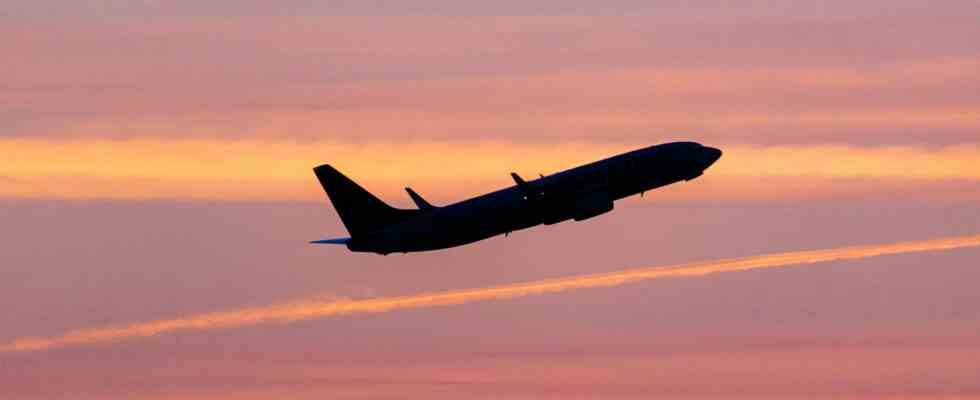Status: 08/23/2022 10:33 a.m
Air travelers must pay the full ticket price at the time of booking. In view of the chaotic situation in the industry, consumer advocates are campaigning to change that. The airlines are against it.
Consumer advocates are calling for an end to the practice of air passengers having to pay the full ticket price when booking their trip. “Passengers are tired of giving the airlines interest-free loans, having to bear the costs of canceled flights or, in the worst case, having to bear the risk of insolvency,” said Marion Jungbluth from the Federal Association of Consumer Organizations (VZBV) to the “Handelsblatt”.
The federal government is being asked to reform the prepayment practice. In future, payment should only be made at check-in. The state of Lower Saxony, which is governed by the SPD and CDU, has also adopted the VZBV’s initiative with a Federal Council initiative. The Green-led Federal Ministry for the Environment and Consumer Protection has also signaled support.
Lower Saxony adopts Federal Council initiative to end prepayment for flights
Marco Heuer, NDR, daily news at 12:00 p.m., August 23, 2022
More complaints
A spokesman for Consumer Protection Minister Steffi Lemke (Greens) said yesterday that the airlines are obliged to make refunds, compensation payments and compensation payments quickly and unbureaucratically in the event of justified claims. It is about strengthening consumer rights.
The increase in complaints to the arbitration board could indicate that this is currently not going entirely smoothly. If this does not develop well, the ministry will review the prepayment practice.
Interest rate disadvantages for customers
However, there are already three judgments by the Federal Court of Justice, which in 2016 declared the airlines’ prepayment principle to be legal. According to the federal judges, consumers are adequately protected by the EU passenger regulation and the risk of insolvency is kept within limits by state controls. Possible interest rate disadvantages for customers are regularly offset by price advantages for early bookings.
But times have changed since then, say consumer advocates, who are now pushing for a change in the law: Only a short time after the BGH ruling, thousands of customers of the insolvent Air Berlin were left with their ticket costs until further notice. The chaos summer of 2018 followed, and finally the Corona shock in March 2020. Hundreds of thousands of tickets were canceled all of a sudden, the Lufthansa Group switched off automated refunds so as not to fall straight into bankruptcy as a result of the outflow of billions in customer money .
Thousands of flights canceled, many delays
The restart this summer saw massive problems and delays in the aviation industry. Due to a lack of workers at the airports and in the jets, Lufthansa alone had to cancel up to 7,000 flights in Munich and Frankfurt. From mid-May to mid-July, more than 258,000 passengers were affected by flight cancellations at NRW airports, as reported by the state government in Düsseldorf. According to the “Handelsblatt”, the number of cases at the arbitration board for public transport (SÖP) has also more than doubled.
In many cases, those affected have the right to a refund of the ticket price within seven days and to compensation payments of between 250 and 600 euros. The EU Air Passenger Directive, which grants passengers these rights, applies from a delay of three hours.
“In practice, the law doesn’t work,” criticizes Helga Zander-Hayat from the consumer advice center in North Rhine-Westphalia. A Lufthansa spokeswoman, on the other hand, said: “Despite the many flight schedule changes, we are making the refunds almost completely within the specified period of just seven days. In this respect, there is no reason for this political initiative.”
Restrictions on early bird rates?
The industry association BDL argues that advance payment is common internationally and also in other service sectors. “By paying in advance, the airlines get planning security and can use their aircraft optimally, which is positive for the climate. In return, they can offer their customers attractive early booking discounts,” says BDL Managing Director Matthias von Randow. “An end to advance payment would mean that the tickets would become more expensive: the risk of default would have to be included, allocated to all tickets and thus co-financed.”
The Federal Ministry of Transport is skeptical about Lower Saxony’s initiative. The proposal will be examined, said a spokesman for Minister Volker Wissing (FDP) to the “Handelsblatt”. In principle, however, the federal government is striving for an EU-wide solution because national regulations are being circumvented and could lead to competitive disadvantages.
“Low-capacity flights could be cancelled”
Lars Watermann from the passenger rights portal “EUflight.de” does not believe that abolishing advance payment will help. “Not a single irregular flight would be more punctual or not canceled as a result. It would rather reinforce the trend that flights are canceled when capacity is too low.” In his opinion, higher compensation payments from the airlines should be the lever.
There is more to the background. The Czech Republic may want to renegotiate the issue of air passenger rights before the end of this year in the Council of the European Union. As early as 2013, the EU Commission had proposed, among other things, that the compensation claims that had existed since 2004 should only be triggered after five hours and also to introduce new “reasons for release” for which the airlines would not have to pay.

